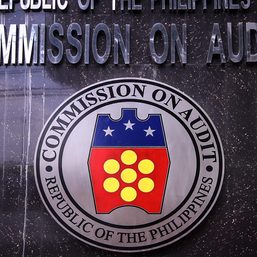SUMMARY
This is AI generated summarization, which may have errors. For context, always refer to the full article.

SORSOGON, Philippines – The Commission on Audit (COA) has flagged the provincial government of Masbate again for its spendings on infrastructure projects, specifically about its use of P641.7 million on road regravellings and rehabilitations.
In a 2023 audit report, released on April 11, 2024, the COA noted that such expenses were already cited in their 2022 audit report on the Masbate provincial government, which needed rectification.
The report, signed by COA Regional Director Juniel Sadiasa, noted that the funds were sourced from a capitol loan with the Development Bank of the Philippines (DBP) secured in 2018, amounting to P2.8 billion, but disbursed in installments.
The “benefits derived from the rehabilitation/re-gravelling projects of barangay roads were found to be short-lived and as such, were not commensurate to the value of resources invested on the same, thus, efficiency, economy and effectiveness in the operations of government may not have been attained,” read part of the COA report.
Citing Section 2 of Presidential Decree No. 1445, COA asserted that government resources must be managed and utilized in accordance with law and regulations to prevent wastage and ensure efficiency and effectiveness.
The COA also pointed out that the program of works lacked the required documents, such as detailed engineering plans, preliminary surveys, and pre-engineering reports in violation of the government procurement law. Auditors said the law, Republic Act 9184, mandates that no program of work for any project should be approved without a detailed engineering plan.
Without a feasibility or engineering study prior to implementation, the effectiveness and sustainability of the road projects could not be assured. The audit questioned the necessity and propriety of the transactions, especially given that “large costs spent for projects that will give short-term or temporary benefits for the constituents create doubt on the necessity and propriety of the transaction.”
The COA said the Masbate provincial engineer admitted that “that large portions of implemented projects were already damaged and the filling materials had been eroded during heavy rain.”
State auditors said the provincial capitol’s funds could have been better used by constructing concrete barangay roads or concrete drainage canals and box culverts to protect the roads from erosion during heavy rain.
They also flagged the Masbate provincial government for implementing the projects through contracts instead of using its own construction and heavy equipment.
COA recommended that the provincial government could have coordinated with the Department of Public Works and Highways (DPWH) for road concreting, which could have saved funds for other urgent needs.
The Masbate provincial government was also called out for violating the full disclosure policy mandated under COA Circular No. 2013-004, which requires public notification of government programs and projects through visible postings.
The rule states: “All government agencies, or the implementing unit, office or division as the case may be, shall notify the public of their PPA through the posting of relevant information detailed in Item 2.1 above on signboards, blackboards, whiteboards, posters, tarpaulins, streamers, electronic boards or similar materials (collectively, “signboards”) not exceeding 3 feet by 2 feet, in conspicuous places within the agency premises, and in the venue where the PPA is located or carried out. This requirement applies to all government PPAs, regardless of amount or source of funds.”
It was not the first time for the COA to flag the provincial government for such practices. In its 2022 audit report, similar violations were noted, indicating a pattern or that these practices were habitual. – Rappler.com
Add a comment
How does this make you feel?



![[WATCH] Rappler Live Jam: dwta](https://www.rappler.com/tachyon/2024/07/live-jam-1280-baba.jpg?resize=257%2C257&crop=179px%2C0px%2C1080px%2C1080px)











There are no comments yet. Add your comment to start the conversation.